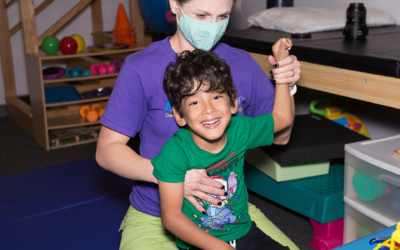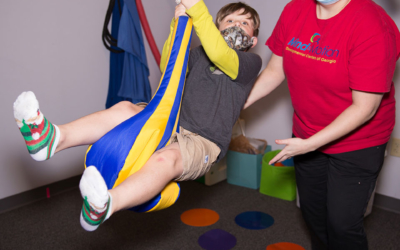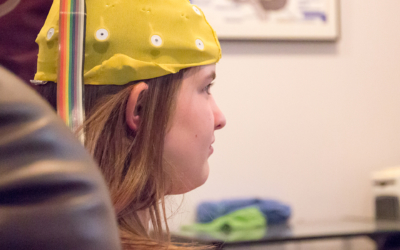
By: Elizabeth Yanow, PT, DPT
Physical, Speech, and Occupational Therapy
If your child demonstrates delayed development, atypical movement, atypical attention to tasks, and more, your pediatrician may recommend one or more evaluations from allied health. To see a full list of diagnoses treated by allied health please visit our website! Allied health is a general term grouping together rehabilitative services. The allied health team is composed of speech and language therapists, occupational therapists, and physical therapists. These therapists can evaluate your child’s impairments and provide a tailored treatment plan to address their individual needs. The first appointment is called the initial evaluation. During this time, the therapist will take the time to get to know you and your child through parent/child interviews, standardized assessments, and play. Here at Mind and Motion we want to assure you that we take all measures to help you and your child feel comfortable in our space. We are skilled in adapting our sessions to meet your child’s need through play.
Booking the Evaluation
The state of Georgia allows for direct access to allied health services. This means that you may book your evaluation without a referral from the doctor. However, a prescription for services and agreement upon services will be required within the first 30 days of the evaluation. That being said, whether you are self-referring or being referred by a physician, you will first be in touch with the intake coordinator.
The intake coordinator will create an account so you can complete forms through our portal system. These forms cover general medical history and specific concerns related to your reasons for seeking speech, occupational, or physical therapy. Once all of these items are completed the evaluation date can be scheduled. – Zulema Godoy, Intake Coordinator
The Evaluation
The therapist will talk with you, the parent, caregiver, or guardian, to review the child’s medical history. The more details you can provide about past medical history and health the better. This allows the therapist to get a picture of your child as a whole. It is also helpful to the therapist if you can provide copies of special test or procedures your child has completed. Examples include, x-ray’s, ultrasounds, MRI’s, swallow studies, genetic testing etc. For insurance and treatment planning purposes, if your child has an Individualized Educational Plan (IEP) the therapist will also need a copy.
After a detailed history is taken the therapist will review specific goals you wish to address through therapy services. If your child is of age, the therapist will also review specific goals they wish to accomplish as well.
Then the therapist will begin administering formal assessments. These assessments will provide the therapist with statistically significant knowledge to determine necessity of services.
Physical Therapy
A physical therapy evaluation can vary depending on age and needs of the child. Generally speaking, the evaluation focuses on large functional movement skills that allow the child to move from one location to another. These skills include getting up and down from the floor, walking up and down stairs, walking on ramps and uneven surfaces such as grass and gravel. The therapist may also assess balance and coordination skills. If the child is under one year of age, the therapist will assess developmental milestones and any asymmetrical developmental patterns. If the child is school age, the therapist will assess higher motor skills such as jumping, running, bike riding and more. Objective assessments that may be used are the AIMS, PDMS-2, BOT-2, Pediatric Balance Scale, Lower Extremity Functional Index, The GMFM, or the 50 Foot Idiopathic Toe Walking Test. All children will be observed for postural asymmetries, functional strength and coordination, through play, that may impact the child’s ability to move or keep up with their peers.
Speech and Language Pathology
A speech-language therapy evaluation can vary depending on the age and needs of the child. Generally speaking, evaluations focus on assessing the client’s capabilities that are necessary to promote functional communication skills. An evaluation assesses a client’s understanding and use of language through a comprehensive objective assessment (such as the OWLS, CASL, or PLS-5) and an informal language sample (such as unstructured conversation). In younger children, the evaluation may also look at play skills. In older children, the evaluation may assess more abstract language skills. In all clients, social skills are assessed. Evaluations may also include assessing a child’s ability to produce various speech sounds, a child’s fluency or the presence of stuttering, and other skills that impact a child’s ability to communicate effectively. In order to complete the evaluation, Mind and Motion will also need a copy of the patient's most recent hearing screening. – Sydney Roberts MS, CCC-SLP
Occupational Therapy
Occupational therapy focuses on supporting clients to engage in meaningful, daily activities. Occupational therapists will assess fine motor coordination, visual motor skills, executive functioning, self-care tasks, sensory processing, as well as life skills needed to function in the home, school, and community. Examples of standardized assessments used are the PDMS-2, BOT-2, the toddler sensory profile, BERRY VMI, REAL, and the Brief-2. Our goal is to support every client to do what they want to do even if it looks different than the way someone else does it. – Ayaka Matsumura MSOT, OTR/L
Creating a Treatment Plan
After the therapist has completed their assessments they will discuss outcomes and treatment recommendations with you. This includes how often you may need to attend in clinic services and how long those appointments may be. This is also a great time to ask any questions you may have about services or what the therapist observed in the evaluation. It is important to understand that as part of a treatment plan, your therapist will provide home exercise programs. These programs will improve outcomes and progress of treatment. As we like to say, “the magic happens at home.” Meaning, it takes repetition and consistency to see change.
Scheduling Appointments
Once you have agreed upon a treatment plan, the therapist will write a formal evaluation and send it to your child’s pediatrician for a signature. This indicates that the pediatrician also agrees with the treatment plan. Once that is returned, our team will send the evaluation to your insurance provider for prior authorization. When we receive authorization from the insurance company a member of our front desk team will contact you to schedule appointments and begin therapy services.
To get started give us a call at 678-749-7600 or request an appointment. We look forward to working with you!





